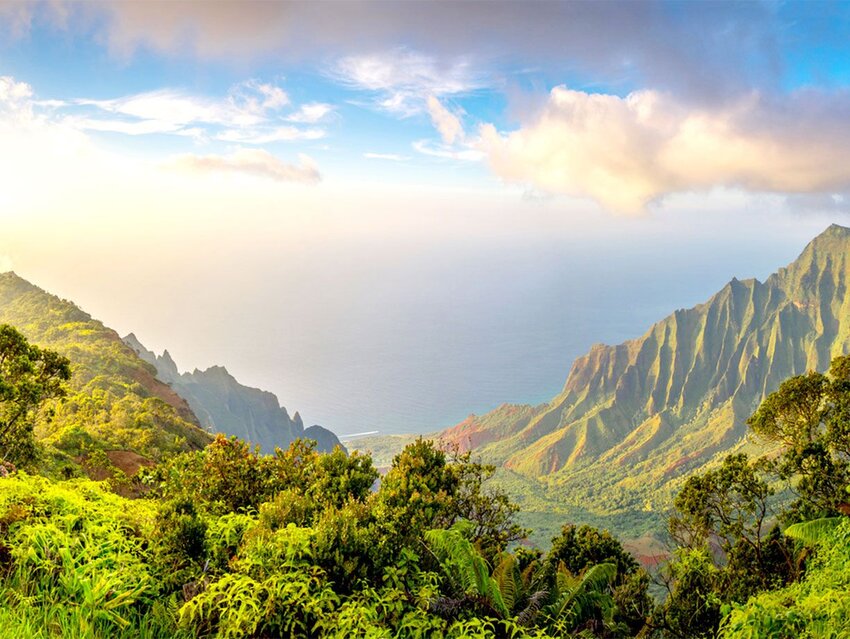Hawaiian is a beautiful, musical language that emphasizes vowel sounds, but, sadly, it’s also on the list of “endangered” languages.
In the mid 19th century, the native Hawaiian language, related to other Polynesian and Oceanic languages, was alive and thriving. In fact, in 1841, the Kingdom of Hawai’i started the first high school west of the Mississippi River, and the literacy rate was estimated at 90%. However, by the end of the century, the monarchy had been overthrown by the U.S. government, leading to decades of white, colonialist attempts to wipe out the native Hawaiian culture.
In 1896, the Hawaiian language was banned from schools, and the government discouraged locals from speaking it at home. As a result, an entire generation lost the ability to communicate in native Hawaiian. Since the 1970s, a movement has been growing to teach students using Hawaiian language immersion. Today, 18,000 people living in the state say they speak both Hawaiian and English at home, giving this lyrical language a chance to live on.
Hawaiian may still be an endangered language, but it’s also hugely influential. Many Hawaiian words have become widely used and recognized in English. Here are just a few examples.
Aloha
It’s probably the best known of all Hawaiian words, and most Americans know this word means both “hello” and “goodbye.” The term aloha literally translates to “love” is used as a simple greeting or parting expression. It’s sometimes used as aloha ’oe as ‘oe means “to you.”
Kahuna
A “kahuna” is a name for an expert in any field. The term is usually applied to a doctor or, in a religious context, to a priest or shaman. Later, it would come to mean “master surfer.” The term was popularized by the 1959 teen beach movie Gidget, which featured a surfing character named the Big Kahuna. Today, we might use it as a tongue-in-cheek phrase for someone important, just like “big cheese” or “head honcho.”
Lanai
This refers to a covered patio or porch with one open side. Lanais are typically found in tropical climates like Florida, California, and, of course, Hawaii. Fans of The Golden Girls will remember the ladies would often relax out on their backyard lanai.
Luau
Like to party? Then you’ll love this Hawaiian feast. Luaus are meals meant to bring a whole group or community together with food and entertainment. The name literally means “young taro tops,” one of the traditional dishes served at a luau. As tourists from the mainland flocked to Hawaii in the 1960s, the popularity of luaus grew around the United States.
Mahi-mahi
You’ve probably spotted this dish on the menu at a restaurant. The English term is dolphinfish, which is not the same as the marine mammal. The Hawaiian word mahi means “strong,” and when words are repeated in Hawaiian, it enhances the meaning — a linguistic process called reduplication. So, “mahi-mahi” means “very strong,” an apt moniker for the dolphinfish, which can grow up to 50 pounds.
Muumuu
Hawaiian vacationers are big fans of this fashion style. This long, loose-fitting dress is often brightly colored and looks like a cross between a robe and a shirt. The garment originated in the 1820s when Protestant missionaries came to the islands and tried to get the local people to dress in long gowns. However, since it was hot, women preferred the flowing style of the muumuu dress. In Hawaiian, mu'u mu'u translates to “cut off,” likely reflecting how a cut off piece of fabric hangs down from the shoulders.
Ohana
This term was popularized by the 2002 Disney movie Lilo & Stitch, where the main characters define it this way: “’Ohana’ means family. Family means nobody gets left behind — or forgotten." Ohana does mean “family” in Hawaiian. It can also refer to extended family or anyone you embrace as part of your family.
Ukulele
This tiny, four-stringed guitar has an interesting linguistic background. The instrument didn’t originate in Hawaii — instead, it came to the islands from Portugal in the late 1800s. Its name means “jumping flea,” supposedly because Hawaiian locals were impressed by how ukulele players had to strum their fingers across the strings rapidly.
Wiki
A “wiki” is any website where users can contribute information and quickly share it on simple, editable pages. Think Wikipedia, WikiHow, or Wookieepedia. The word “wiki” was coined in 1995 by Ward Cunningham, the creator of the WikiWikiWeb, the first user-editable website. On a trip to Hawaii, Cunningham was told to take the Wiki Wiki Shuttle — wiki wiki being the Hawaiian term for “very quick.” He thought “Wiki Wiki Web” was more fun to say than “Quick Web,” and a tech term was born.
Featured image credit: HaizhanZheng/ iStock

